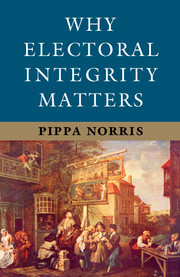Book contents
- Frontmatter
- Contents
- List of Figures
- List of Tables
- Preface and Acknowledgments
- Part I Introduction
- 1 Theories Why Electoral Integrity Matters
- 2 The Concept of Electoral Integrity
- 3 Evidence
- Part II The Problem of Flawed Elections
- Part III The Consequences of Electoral Integrity
- Part IV Conclusions
- Technical Appendix A: Description of Variables and Scale Construction
- Technical Appendix B: Questions in the Expert Survey of Perceptions of Electoral Integrity
- Technical Appendix C: Electoral Context and Background in the Selected Cases
- Notes
- Select Bibliography
- Index
1 - Theories Why Electoral Integrity Matters
Published online by Cambridge University Press: 05 July 2014
- Frontmatter
- Contents
- List of Figures
- List of Tables
- Preface and Acknowledgments
- Part I Introduction
- 1 Theories Why Electoral Integrity Matters
- 2 The Concept of Electoral Integrity
- 3 Evidence
- Part II The Problem of Flawed Elections
- Part III The Consequences of Electoral Integrity
- Part IV Conclusions
- Technical Appendix A: Description of Variables and Scale Construction
- Technical Appendix B: Questions in the Expert Survey of Perceptions of Electoral Integrity
- Technical Appendix C: Electoral Context and Background in the Selected Cases
- Notes
- Select Bibliography
- Index
Summary
Ideally, when elections work well, they can select officeholders and governments, determine policy priorities, link citizens (as principals) with representatives (as agents), generate inclusive legislatures, confer legitimacy on elected authorities, hold leaders to account, and provide the main opportunity for most ordinary people to participate in politics. Unfortunately, too often elections around the globe fail to meet these ideals. In some contests, opponents are excluded from the ballot. Districts are gerrymandered. Campaigns provide a skewed playing field for parties. Independent media are muzzled. Citizens are ill-informed. Electors are threatened by violence. Ballot boxes are stuffed. Vote counts are fiddled. Opposition movements organize boycotts. Incumbents disregard the people’s choice. Post-election protests signal public dissatisfaction. Partisan officials abuse state resources. Electoral registers are out of date. Candidates distribute largesse and buy votes. Airwaves favor incumbents. Campaigns are awash with money. Incompetent local officials simply run out of ballot papers. Voting machines break. Lines lengthen. Ballot box seals break. “Secure” ink washes off fingers. Courts fail to resolve complaints impartially. Well-run elections by themselves are insufficient for successful transitions to democracy. But flawed or even failed contests can undoubtedly wreck fragile progress.
In the light of these problems, most attention has often focused on regimes stranded somewhere in the grey middle zone, falling neither into the category of absolute autocracies nor into that of established democracies. In this book, they are designated electoral autocracies, although they have also been termed hybrid regimes (Diamond), competitive authoritarian (Levitsky and Way), and electoral authoritarian (Schedler). Whatever their precise nomenclature, the characteristic feature of this type of regime is that, unlike traditional absolute monarchies, one-party states, military juntas, or personal dictatorships, national legislative offices are filled through multiparty elections. But the rules of the game are heavily tilted in favor of the incumbents.
- Type
- Chapter
- Information
- Why Electoral Integrity Matters , pp. 3 - 20Publisher: Cambridge University PressPrint publication year: 2014
- 12
- Cited by



